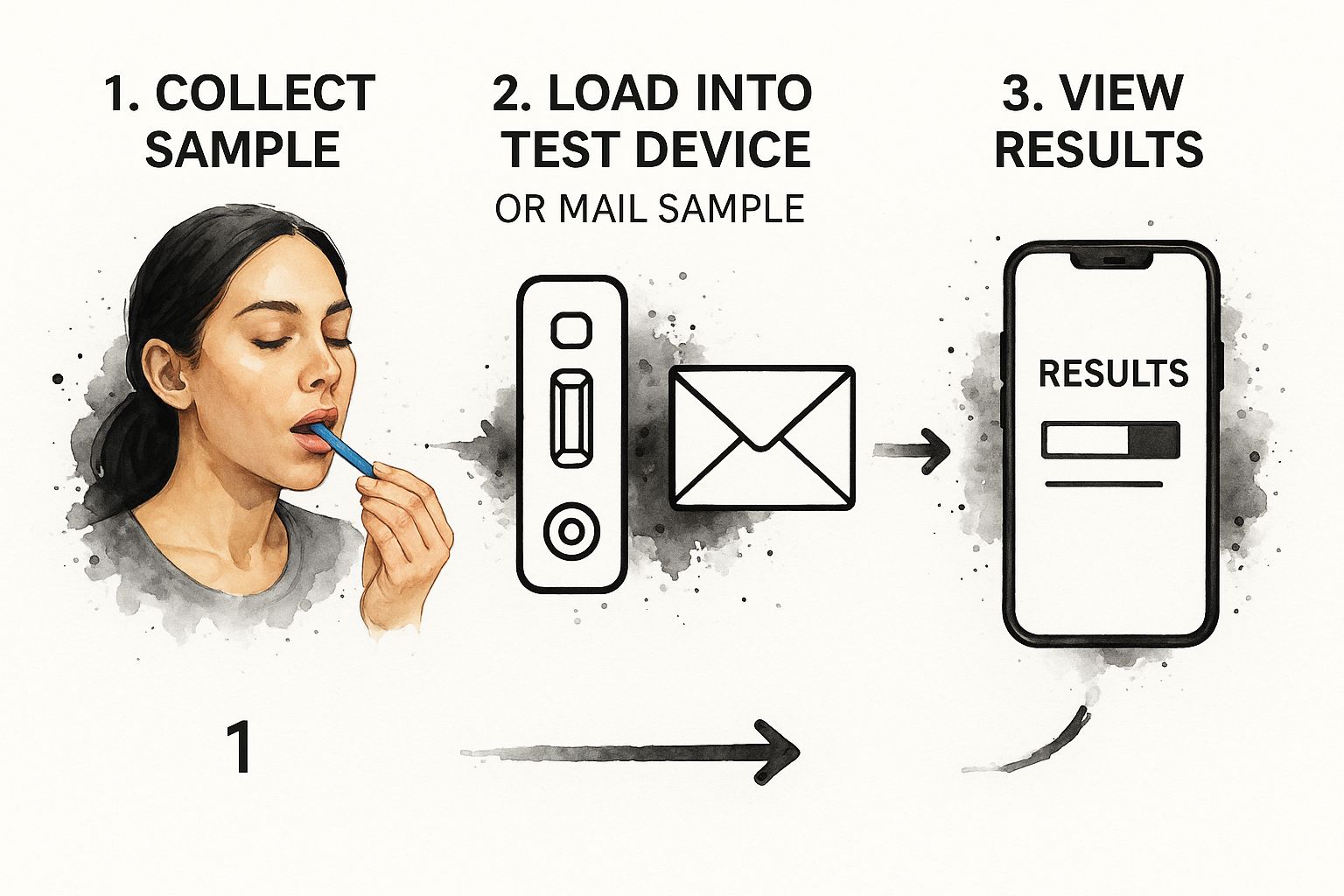At-home hormone testing offers a straightforward way to get a snapshot of your body’s key chemical messengers, providing actionable insights for your long-term health strategy. All it takes is a simple sample—usually from a finger-prick blood test, saliva, or urine—to start understanding your health on a much deeper level and make proactive choices for a longer, healthier life.
Think of it as an essential tool for anyone serious about longevity. This isn't about self-diagnosing, but about gathering personalised data to build a targeted wellness plan and putting valuable health metrics directly into your own hands.
Your Personal Health Dashboard: Understanding Hormone Tests for Longevity

Imagine your body has a dashboard, just like your car. While your car’s dashboard shows fuel levels and engine status, an at-home hormone test gives you a glimpse into your body’s internal systems, revealing how well you are ageing at a cellular level. It helps demystify what’s going on inside, turning complex biological signals into clear, actionable metrics for your longevity plan.
This isn’t some intimidating medical procedure. It’s a simple tool that puts you in control of your healthspan. A tiny finger-prick sample can reveal the levels of powerful hormones like oestradiol, testosterone, and cortisol. These chemical messengers are the bedrock of almost every function in your body, from how your cells repair themselves to your metabolism and resilience to stress.
Why This Data is Critical for Longevity
Monitoring these hormone levels is a cornerstone of any effective longevity strategy. When you establish your unique hormonal baseline, you can move beyond generic health advice and start making informed lifestyle choices that genuinely support your goal of living a longer, more vibrant life.
This information is particularly powerful for navigating age-related transitions like perimenopause or managing thyroid function, which directly impacts metabolic health. It allows you to take a personalised approach to optimising your biology and track the impact of your efforts over time. For anyone with a menstrual cycle, it's also crucial to understand the natural hormonal shifts of the menstrual cycle, as these fluctuations will naturally influence your test results.
At-home testing provides the baseline data needed to build a proactive longevity plan. It transforms abstract feelings of being "off" into concrete data points you can use to optimise your healthspan.
To give you a better idea of what you can learn, here’s a look at some of the key hormones you can test for at home and how they connect to your long-term health and vitality.
Key Hormones You Can Test and Their Role in Longevity
| Hormone | Primary Function | Longevity Impact (e.g., energy, bone health) |
|---|---|---|
| Oestradiol (E2) | Regulates the menstrual cycle, supports bone density, and influences mood and cognitive function. | Optimal levels are crucial for bone health, cardiovascular protection, and preserving cognitive function. |
| Testosterone | Supports muscle mass, bone density, libido, and energy levels in all genders. | Key for maintaining muscle strength (sarcopenia prevention), vitality, and a healthy metabolism. |
| Cortisol | The primary "stress hormone" that manages inflammation, blood sugar, and your sleep-wake cycle. | Balanced levels mitigate chronic inflammation, a key driver of ageing, and support cellular repair during sleep. |
| Thyroid Hormones (TSH, T4) | Regulate metabolism, controlling how your body uses energy. | Directly impacts metabolic health, energy production, and your body's ability to maintain a healthy weight. |
This table is just a starting point, but it shows how understanding these specific hormones can empower you to make targeted improvements to your healthspan.
There's a growing movement across the UK towards taking control of personal health data. In fact, the women's health diagnostic market in the UK is projected to reach approximately $1.3 billion by 2030. This surge is largely driven by people seeking more personalised options to optimise their own biology.
By embracing hormone level testing at home, you’re joining this shift toward greater health autonomy and paving the way for a longer, healthier life.
How Monitoring Hormones Enhances Your Longevity

Keeping an eye on your hormones isn't just about getting a one-off snapshot of your health. It’s a powerful strategy for extending your healthspan—the number of years you live in good, vibrant health, not just your lifespan.
Think of your hormones as the body's internal orchestra, directing the symphony of ageing. When one instrument is out of tune, the entire performance suffers. Over time, this disharmony can accelerate biological ageing.
Regular hormone level testing at home puts you in the conductor's seat. It lets you spot subtle hormonal shifts long before they manifest as the chronic conditions that define "old age." This proactive approach gives you the power to intervene early and preserve your vitality for decades to come.
The Foundation of Healthy Ageing
Your hormones are the bedrock of the systems that keep you feeling young and energetic. They are absolutely fundamental to your quality of life as you get older, influencing everything from physical strength to mental clarity.
Even small imbalances can have a massive cumulative effect over the decades. Take cortisol, your body’s stress manager. When it’s consistently high, it doesn't just leave you feeling frazzled; it drives low-grade inflammation and cellular damage, which are key culprits in the ageing process. Monitoring it empowers you to manage stress before it chips away at your longevity.
This principle extends to all key aspects of healthy ageing.
- Sharper Cognitive Function: Hormones like oestrogen and testosterone are neuroprotective. Keeping them in balance helps preserve memory, focus, and cognitive resilience as you age.
- Sustained Muscle Mass: Age-related muscle loss, or sarcopenia, is a primary driver of frailty and is often linked to declining testosterone and growth hormone. Tracking these levels allows for targeted fitness and nutrition plans to stay strong.
- Better Sleep Quality: Your sleep-wake cycle is regulated by hormones like progesterone and cortisol. Optimising these can unlock restorative sleep, which is critical for cellular repair and glymphatic drainage in the brain.
By catching these changes early, you can take preventative steps instead of just reacting to issues once they become serious. This is what a modern longevity strategy is all about.
Monitoring your hormones is like having an early warning system for your long-term health. It lets you tackle the root causes of age-related decline, not just the symptoms, so you can build a personalised plan for a longer, more vibrant life.
To truly get ahead, it's wise to look beyond just your current hormone levels and consider your genetic predispositions. For a deeper dive, exploring the connection between hormone optimization and genetic testing for longevity can be a game-changer.
This information helps you create a highly personalised strategy for healthy ageing, combining smart lifestyle choices with an understanding of your unique biological blueprint.Navigating Your First At-Home Hormone Test
Taking your first at-home hormone test might seem a little daunting, but the whole process is actually designed to be incredibly simple. It’s all about giving you direct access to powerful health insights without ever needing to step foot in a clinic. Let's walk through the entire journey, from picking the right kit to popping your sample in the post.
First things first, you need to choose a test that actually matches your wellness and longevity goals. What are you trying to figure out? Maybe you're looking to optimise your energy levels, investigate symptoms that could point to perimenopause, or just get a clear baseline of your hormonal health. Different tests look at different biomarkers, so picking one that answers your specific questions is the most important first step.
Once your kit lands on your doormat, you’ll find the process is clear and very manageable. Most modern kits, especially those for hormone level testing at home, use a simple finger-prick blood sample. It's minimally invasive and takes just a few minutes, all from the comfort of your own home.
Making the Process a Success
The key to getting an accurate result first time is feeling confident when you collect your sample. A little bit of prep goes a long way. Before you start, make sure you’re well-hydrated and warm up your hands – washing them in warm water or even swinging your arms around for a minute works wonders. This gets the blood flowing and makes collecting the sample much easier.
Follow the instructions in your kit to the letter. You’ll usually get sterile lancets for a quick, clean prick. It’s best to aim for the side of your fingertip, as it’s less sensitive. Then, just gently massage down your finger to help the blood drops form and collect them in the vial or on the card provided. While the finger-prick method is standard, some people prefer a more traditional blood draw. If that's you, it's worth exploring what is at-home phlebotomy as a convenient alternative.
This handy infographic shows just how simple the core steps are.

As you can see, the journey from collecting your sample to getting your results is a straightforward, three-part system built around you.
Finalising Your Test
With the sample collected, you're on the home stretch. The last couple of steps are just logistics. You’ll need to register your kit online with the unique code that comes inside. This is a crucial step as it links your sample to your secure, personal account, ensuring your results are delivered privately to you and nobody else.
Don't forget this bit! The lab can't process your sample until it's registered, so make sure you do it before posting your kit back.
Finally, just package everything up in the pre-paid return envelope, seal it securely, and drop it in a postbox. That’s it – you’re done! From there, an accredited lab takes over the analysis, and you'll get a notification as soon as your personalised results are ready to view on your digital health dashboard. By following these simple steps, you can take a confident and proactive step towards understanding your health.
Choosing a Reliable UK Hormone Testing Service
With more and more at-home health tests popping up, trying to pick a trustworthy provider for hormone level testing can feel a bit overwhelming. But make no mistake, this decision is one of the most important you'll make for your long-term health. The quality of your test results directly shapes the quality of your health decisions, so it's crucial to partner with a service that’s accurate, transparent, and genuinely supportive.
Not all tests are created equal, and the fallout from using a subpar service can be serious. Inaccurate results don't just waste your money; they can lead you to implement lifestyle changes or treatments that are ineffective or even harmful.
Think of it like using a dodgy compass on a long hike. A tiny error at the beginning can leave you miles off course by the end.
Key Markers of a Quality Service
To protect your health (and your wallet), there are a few non-negotiable things to look for. Top of the list? Make sure the service uses UKAS-accredited laboratories. This accreditation is the gold standard here in the UK. It’s a sign that the lab meets incredibly strict standards for quality and competence—the very same ones the NHS relies on.
Beyond the lab, look at the whole experience. A good provider will be open and honest about their testing methods and what each biomarker actually means for you. They should also offer clear, professional support after you get your results, like a follow-up review with a qualified doctor. This is what turns raw data into a real action plan for longevity.
Our guide to private blood tests at home goes into a bit more detail on what you should expect from a top-tier service.
The goal isn't just to get numbers on a screen. It's to gain a clear, confident understanding of your health. A trustworthy service provides not only accurate data but also the expert context needed to make sense of it all.
Unfortunately, the risk of getting an unreliable test is very real. Recent investigations have uncovered major accuracy issues with some at-home tests sold in the UK, especially for crucial hormones like oestradiol. These reports found that some big-name labs kept processing finger-prick tests for months, even after they knew there were problems with accuracy.
This is why being picky is so important. A misleading result could influence life-changing decisions about treatments like HRT or IVF. Vetting your provider carefully is essential.
To help you navigate this, here’s a quick checklist of what to look for when you're comparing different services.
Checklist for Selecting a Trustworthy Test Provider
| Feature to Check | Why It's Important for Accuracy and Safety | Red Flag to Watch For |
|---|---|---|
| UKAS Accreditation | This is the official UK gold standard, ensuring the lab meets rigorous quality controls, just like NHS labs. | No mention of UKAS or using vague terms like "certified" without specifying the accrediting body. |
| Clear Doctor/Clinician Review | A qualified professional should review your results to provide medical context and safe, actionable advice. | Results are sent with no follow-up, or the "support" is just an automated report or customer service chat. |
| Transparency on Sample Type | The provider should be upfront about whether they use finger-prick or venous samples and why. | Promoting finger-prick tests for hormones known to be less accurate with that method (e.g., oestradiol). |
| Data Privacy and Security | Your health data is sensitive. The service must comply with UK GDPR and clearly state how your data is stored and used. | A vague or non-existent privacy policy. |
| Reputable Customer Reviews | Look for independent reviews on platforms like Trustpilot that speak to the entire process, not just speed. | Only having curated testimonials on their own website. |
Ultimately, by prioritising services with UKAS accreditation and proper professional oversight, you can be confident that you’re building your health journey on a foundation of trust and genuine accuracy.
Turning Your Test Results into Actionable Insights for Longevity

Getting your results from hormone level testing at home is just the beginning. The real power for longevity comes from translating that data into action. It’s easy to feel a bit overwhelmed by a report full of numbers and 'reference ranges', but see it less as a final verdict and more as a personal roadmap to optimise your healthspan.
While reference ranges tell you what's considered 'normal' for the general population, what truly matters is what's optimal for you and your longevity goals. The key is to connect the data to specific, actionable changes. For instance, low progesterone isn’t just a number; it’s an opportunity to improve sleep hygiene, which is critical for cellular repair. Similarly, high cortisol levels provide a clear metric to motivate a consistent stress management practice like meditation or breathwork, combating a key driver of accelerated ageing.
From Data to Daily Habits
This is where you build a foundation for long-term health. Translating your results into small, meaningful lifestyle changes is how you compound health benefits over time. Instead of guessing, you can make targeted adjustments based on your unique biology.
- Elevated Cortisol? This is a call to action to prioritise stress reduction. Implement a daily 10-minute mindfulness practice or ensure you get morning sunlight exposure to regulate your circadian rhythm.
- Low Testosterone? Focus on resistance training and ensure adequate protein intake to support muscle synthesis, a cornerstone of healthy ageing.
- Thyroid Imbalance? Look at your diet. Ensure sufficient intake of key nutrients like selenium (from Brazil nuts) and iodine (from seaweed) to support thyroid function and metabolic health.
Sleep is another huge piece of the puzzle. A bad night's sleep can throw nearly every hormone in your body out of whack. If your results show imbalances in cortisol or progesterone, looking into strategies for improving sleep is a fantastic next step towards regaining your balance.
Starting a Productive Conversation
Think of your test results as your secret weapon for a more productive chat with your GP or a specialist. Rather than showing up with vague symptoms like "I just feel tired all the time," you can walk in with actual data. This completely changes the conversation, positioning you as an informed, active participant in your own healthcare.
The goal of at-home testing isn’t to diagnose yourself. It's about empowering you with the knowledge to ask the right questions and have a data-driven discussion about your long-term health strategy.
Before you go to your appointment, jot down a few specific questions inspired by your results.
- "My report shows my oestradiol is at the lower end of the normal range for my age. Could this be why I'm feeling so low on energy?"
- "My cortisol levels are consistently high. What stress management techniques would you suggest I try?"
- "How do these testosterone results fit with my goal of maintaining muscle mass as I get older?"
By using your test as a starting point, you turn a simple page of numbers into a powerful tool for change. To learn more about taking this proactive stance, check out our guide on the benefits of at-home health testing.
Where At-Home Testing Fits into Your Health Journey
Let's be clear: at-home hormone tests aren't here to replace your GP. Instead, think of them as a powerful ally, working hand-in-hand with the traditional UK healthcare system. They're a smart, complementary tool that puts preliminary data in your hands, which can be invaluable when you're facing long NHS waiting times for specialist appointments.
This approach is particularly useful in certain situations. If you're planning a family, for example, tracking your fertility hormones month by month can offer incredible insights. Likewise, if you're navigating the often-confusing perimenopausal transition, monitoring key markers can bring a sense of clarity and control.
These tests also fill a crucial gap when you're wrestling with persistent symptoms that aren't quite urgent enough for a fast-tracked referral. Things like relentless fatigue, brain fog, or unexplained mood swings can be tough to get to the bottom of in a standard 10-minute GP visit.
Taking Control While You Wait
By using hormone level testing at home, you can start gathering objective data while you're on a waiting list. This simple step can completely change the dynamic of your future consultations. You're no longer just describing vague feelings; you're walking in with a clear picture of your hormonal patterns over time. This makes for a much more focused and productive conversation with your doctor.
This proactive approach is especially vital for conditions notorious for long diagnostic delays. Take polycystic ovary syndrome (PCOS), which affects roughly 1 in 10 women in the UK. Shockingly, more than half of these women wait over six months for a diagnosis. You can dig deeper into diagnostic timelines and find out about the best blood tests for female hormones on forthwithlife.co.uk.
By giving you a data-driven starting point, at-home tests help you become a better advocate for your own health. You're not just passively waiting for answers; you're actively looking for them.
Ultimately, these tests put you in the driver's seat of your long-term health. They provide the kind of actionable insights you need to make informed lifestyle changes and work more effectively with your healthcare team, ensuring you get the best possible care on your journey to a longer, healthier life.
Got Questions About At-Home Hormone Tests?
Deciding to test your hormones at home is a big step, so it’s completely normal to have a few questions swirling around. Getting to grips with the details can help you feel much more confident about taking control of your long-term health. Let's tackle some of the most common ones.
One of the first things people ask is, "Are these tests actually accurate?" The short answer is yes, provided you choose a high-quality kit from a reputable provider that uses UKAS-accredited labs. The sample collection method does matter, though. A simple finger-prick test is brilliant for many markers, but for others, like oestradiol, a venous blood draw (like you'd have at the GP) can give a more precise reading.
And what happens after you get the results? That's another big one. It's crucial to remember that these tests aren't for diagnosing yourself. Their real power is in giving you solid data to take to your doctor or another healthcare professional. This information can be the starting point for a meaningful conversation, helping to guide lifestyle changes or point towards any further investigations that might be needed.
A Few Things to Think About Before You Test
Before you click "buy", it's smart to consider a couple of practical points.
If you have a menstrual cycle, timing is everything. Your hormone levels can change dramatically throughout the month, so for the results to be meaningful, you often need to test on specific days. A test for follicle-stimulating hormone (FSH), for instance, is usually best taken around day three of your cycle.
A single test gives you a valuable snapshot in time. But the real insight, especially for planning your long-term health, comes from tracking your levels over a longer period. This helps you and your doctor spot trends and figure out what your personal hormonal baseline looks like.
You might also be wondering about privacy. And you should be! Any trustworthy UK provider is legally bound by strict GDPR rules, which means your sensitive health data is kept secure and confidential. Always have a quick read of a company’s privacy policy before you commit.
Ultimately, at-home hormone testing is a tool that puts you in the driver's seat. It gives you the information you need to move from vague wellness goals to a clear, evidence-based strategy for a longer, healthier life.
Ready to gain a deeper understanding of your health? Lola provides professional, at-home blood testing using UKAS-accredited labs to give you the clear insights you need. Start your journey to optimised health by exploring our services.


